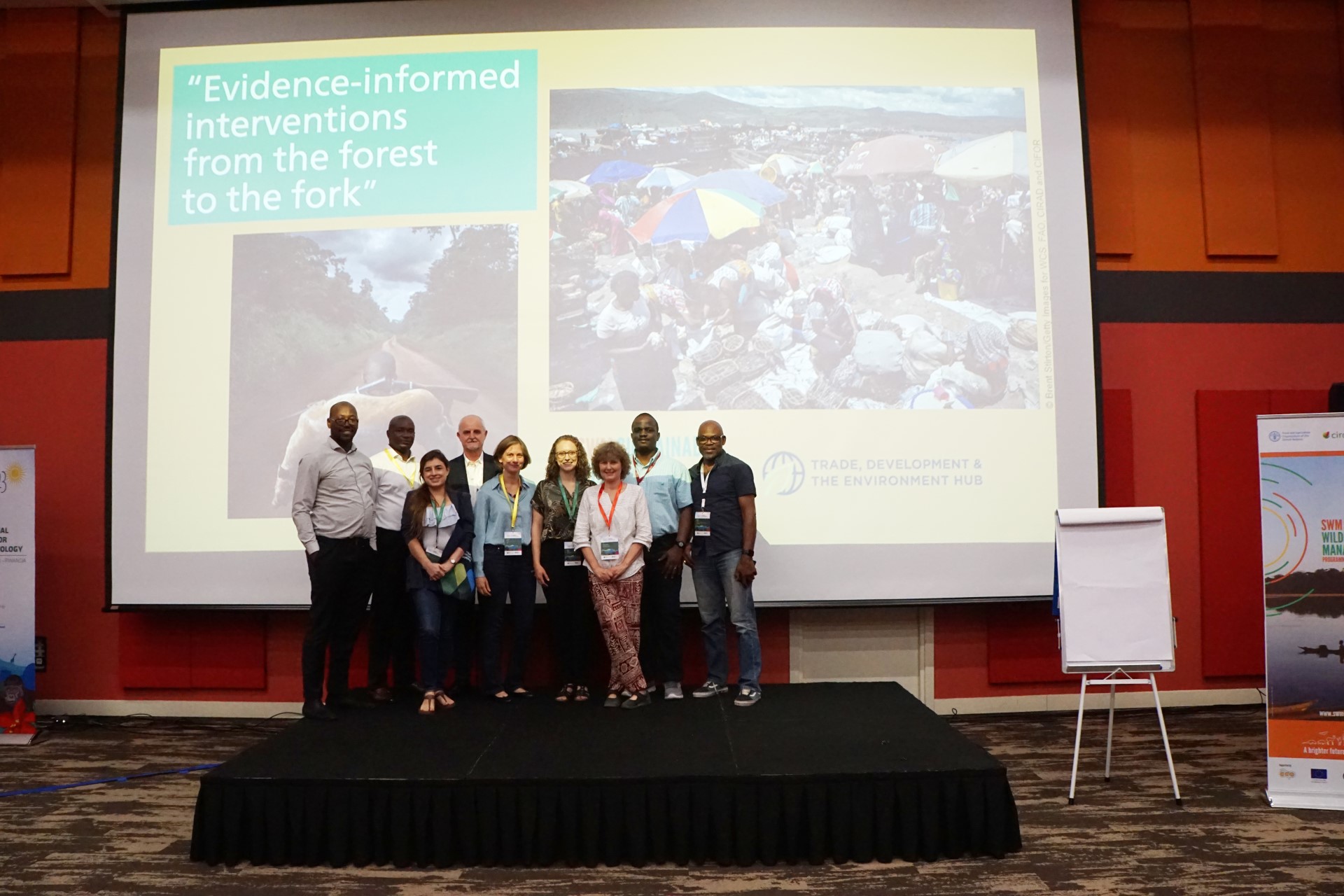
International Congress for Conservation Biology 2023
A wild meat symposium took place at the 2023 International Congress for Conservation Biology (ICCB 2023) from July 23-27 in Kigali, Rwanda.
Wild meat is consumed across Central Africa, often representing a key source of protein and micronutrients for rural communities where few alternatives are available. However, over the last few decades, population increases and rapid urbanization has created significant numbers of metropolitan consumers in major cities but also in towns, consuming wild meat as a luxury or festival food. As urban populations grow, hunting pressures on wildlife increase, with significant impacts on keystone species and forest ecosystems. Although growth in urban demand has presented an economic opportunity to rural communities, unsustainable offtake threatens rural food security in the long term. Reducing the scale of wild meat offtake and trade to sustainable levels is central to ensuring ecosystem and public health in Central Africa and globally.
A symposium on ‘Evidence-informed interventions from the forest to the fork - sustainable wild meat management in Central Africa’, co-organised by the Sustainable Wildlife Management (SWM) Programme and the Trade, Development and Environment Hub, brought together research from a range of disciplines, presenting and evaluating policies and interventions aiming to achieve the legal, sustainable, equitable and safe use of wild meat in Central Africa.
Presentations:
- Robert Nasi, Chief Operating Officer, CIFOR-ICRAF and Director General, CIFOR. Achieving sustainable, equitable and safe use of wildlife for food in Central Africa.
- Mattia Bessone, Postdoctoral Researcher, CIFOR-ICRAF. The consumption of wild meat in Central Africa: a regional analysis of temporal and spatial trends.
- Davy Fonteyn, Postdoctoral Researcher, CIRAD. Engaging rural communities in sustainable hunting: progress and lessons learned in Central Africa by the Sustainable Wildlife Management Programme.
- François Sandrin, Sustainable Hunting Technical Advisor, WCS. Planning for sustainable wildlife management is not a game… or is it?
- Germain Aime Mavah, SWM Programme Coordinator in Congo, WCS. Sustainable hunting in an African lowland forest: a case study of the Kabo hunting zone.
- Juliet Wright, Technical Advisor on Wild Meat Trade and Consumption, WCS. Understanding urban supply and demand for wild meat to inform and scale up demand reduction and policy reform efforts in Central Africa.
- Cedric Thibaut Kamogne Tagne, Researcher, CIFOR-ICRAF. Understanding risks of disease transmission in the wild meat food chain from forest to fork in Cameroon.
- Divin Vuakere Malekani, Researcher, WCS. From the forest to Facebook: investigating the increasing role of online marketplaces in the trade of wild meat in West and Central Africa.
- Eric Nana, Postdoctoral Researcher, University of Oxford. Using scenario-based interviews to predict which interventions could elicit behaviour change by urban wild meat trade actors in Central Africa.
- Liliana Vanegas, Urban Bushmeat Program Coordinator, WCS. Reducing wild meat consumption through a behaviour change approach: experiences from Central Africa and Madagascar.
 Speakers of the wild meat symposium at the International Congress for Conservation Biology 2023
Speakers of the wild meat symposium at the International Congress for Conservation Biology 2023
The SWM Programme is an international initiative, co-funded by the European Union, the French Facility for Global Environment and the French Development Agency. It is being implemented by the Food and Agriculture Organization of the United Nations (FAO), the French Agricultural Research Centre for International Development (CIRAD), the Centre for International Forestry Research and World Agroforestry (CIFOR-ICRAF) and the Wildlife Conservation Society (WCS). Visit www.swm-programme.info
The UKRI GCRF Trade, Development and the Environment Hub is funded by the UK Research and Innovation’s Global Challenges Research Fund, led by the UN Environment Programme World Conservation Monitoring Centre (UNEP-WCMC). This five-year project brings together over 50 organizations from 15 different countries to help make trade sustainable for people and the planet. Together, these partners from industry, trade agencies, research, governments and civil society will study all stages of various supply chains, revealing damaging links and potential ways to make lasting change.